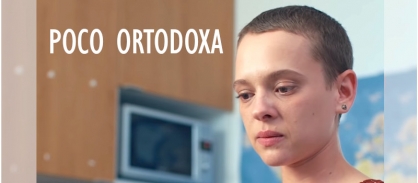Unorthodox

A compass starts and ends this Netflix miniseries, and thus offers us a key to understanding the story of the young Esty: her deep desire to know where to take her life, to be faithful to herself and to God.
A part of the story takes place in New York, in the Williamsburg neighborhood, where a highly orthodox Hasidic Jewish community lives. The production of the film received all the advice of an expert, from the same neighborhood, to be able to recreate in the film the environment of the community, its language and its daily and religious customs, in such a precise way that it almost seems like a documentary. No, there are no exaggerations, as it may seem to us non-Jews. They have their own way of putting themselves before the world and before God.
In this context, the story focuses on what a 19-year-old girl has lived and lives, who, being a woman, cannot study, cannot comment, cannot prefer something totally personal, cannot choose a boyfriend; and upon marriage, her whole mission is to be the wife of the head of the family and the mother to procreate children, preferably males who perpetuate the offspring and the name of the husband. He prepares for that and lives for it. However, Esty confesses to Yanky, her fiancé, that she is different from other young women: she thinks more about things, likes to read, secretly learns music, was raised by her grandmother and not by her parents. From the beginning of the film we guess on her face that Esty lives her entire environment with bewilderment and sadness, seeking to take her own place.
In Jewish tradition, if a wife cannot have children or does not know how to manage her home well, the husband can dismiss her with a divorce decree. In the gospel (cf Mt 19: 1-9) Jesus says that "Moses allowed this because of the hardness of his heart", because of his sclerocardia, but that this is not the original plan of God who wants men and women as equal, as one. When Yanky, pressured by his mother, gives Esty that divorce petition, she decides to escape to Berlin, with the documents proving that her ancestors are German. It begins for her to "find her own way", open up to a different reality, discover what it means to be a woman. The compass, the heart, your deepest desires, will be that not at all easy path, also perplexing and learning.
Deborah Feldman's memoirs, Unorthodox: The Scandalous Rejection of My Hasidic Roots, a 2012 book success (not yet translated into Spanish), greatly interested three women: German director and actress Maria Schrader and professional screenwriters Anna Winger and Alexa Karolinski, and they decided to make a four-episode miniseries inspired by the book for Netflix. They faced the challenge of writing a script that is mostly spoken in Yiddish or Yiddish, a language that originated in the Ashkenazi Jewish communities, which settled in central Europe during the centuries that followed the flight of the Jews from the land of Israel. , and that during the late Middle Ages they moved progressively towards Eastern Europe, and they created this language, a combination of Hebrew, German, Hungarian and Polish. Many of the Yiddish survivors of the German Holocaust migrated to New York and continue to keep alive their tradition and the memory of God and the people. Half of the Unorthodox film is located in Berlin where paradoxically thousands of German Jews died, and thus results in a reconciliation with history and with that multicultural and modern city.
The heart of the narration, Esty's character, is wonderfully developed by the young Israeli actress Shira Haas, petite, short in stature, with huge eyes and delicate features, which gives her performance all the energy and determination, bewilderment and fear of such a captivating and searching personality. The rest of the actors do a very good job, especially in recreating Hasidic Jewish customs.
Told in episodes that alternate between New York and Berlin, Little Orthodox is a beautiful and moving story of freedom, one that is born from entering the depths of the heart and letting out the desires that fight to come to life and find true life. In Esty, this path of the heart, of listening and discernment, is nurtured and empowered by music: in that which from a young age, secretly, listens with the grandmother; in secret piano lessons, in the meeting of such diverse friends at the conservatory, in the firm desire to have an audition and continue learning, in the tears caused by the choir of women in a church, in the freedom and love that they give him disco music; to be able to interpret in Yiddish, in Berlin, the song of his wedding, and Schubert's ode to music: “When the fierce circle of life grips me, you have inflamed my heart with a warm love, you have led me to a better world". The compass and music open and close this story. Upon completion, Esty is no longer the same; neither do we.
Luis García Orso, SJ
Mexico, May 17, 2020






